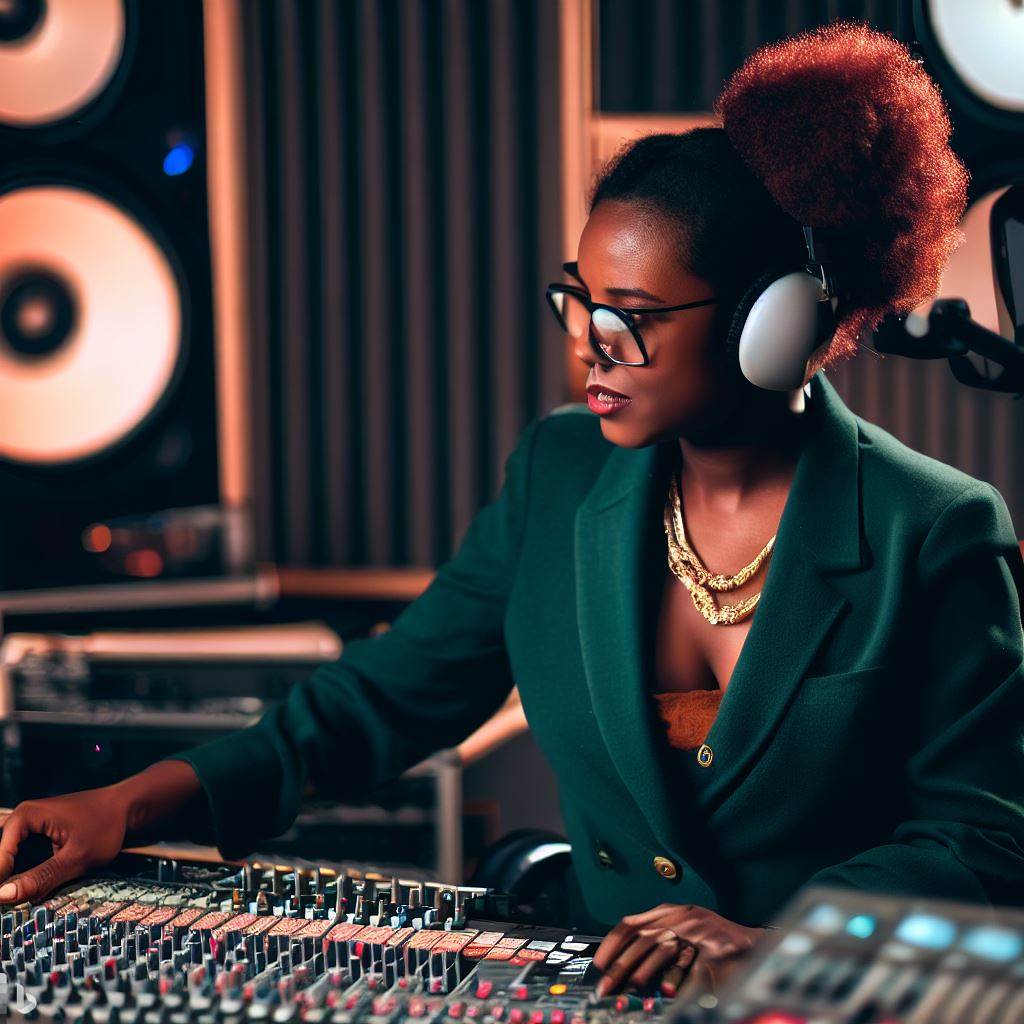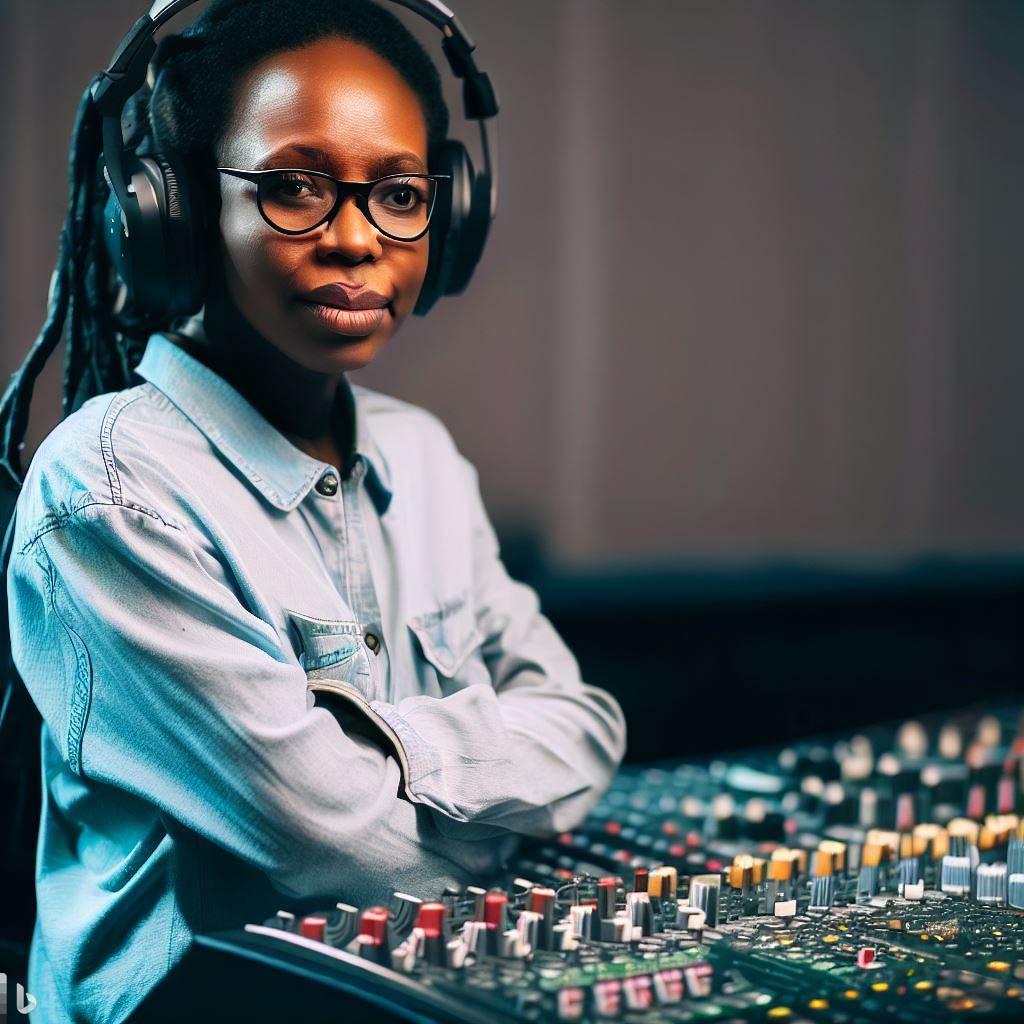Introduction
The life of a Nigerian mixing engineer plays a crucial role in the music industry. They are responsible for shaping the sound and ensuring a balanced and polished final product.
The significance of their work cannot be overstated, as it directly impacts the listeners’ experience and the success of the artist.
Nigerian mixing engineers possess a unique set of skills and knowledge that allows them to blend different elements of a song and create a cohesive and sonically pleasing track.
This blog post aims to provide an insight into the world of Nigerian mixing engineers, shedding light on their expertise and the challenges they face in their profession.
Through exploring their role in the music industry, we can gain a deeper understanding of the artistry and technicality behind the production process.
Nigerian mixing engineers are highly sought after due to their ability to incorporate cultural influences into the music, infusing it with the vibrancy and energy synonymous with Nigerian culture.
They possess a keen ear for detail, ensuring that each instrument and vocal is heard clearly and harmoniously.
Their work often involves collaborating with artists, producers, and record labels, as they strive to bring the artist’s vision to life.
In the end, the life of a Nigerian mixing engineer is an integral part of the music industry, contributing to the creation of impactful and immersive musical experiences.
What is a Mixing Engineer?
A mixing engineer is a crucial individual in the music production process. They are responsible for blending and balancing the various audio elements of a song to create the final sound.
Definition of a Mixing Engineer
- A mixing engineer is a skilled professional who manipulates audio tracks to achieve the desired sound.
- They use specialized equipment and software to adjust levels, add effects, and enhance the overall quality of the music.
- Their role is to ensure that each instrument and vocal in a song is audible and properly mixed.
- They work closely with artists, producers, and recording engineers to achieve the intended sonic vision.
Role in the Music Production Process
- A mixing engineer takes raw audio recordings and transforms them into a polished and cohesive musical piece.
- They carefully listen to each track, removing unwanted noise and adjusting volume levels.
- They employ various techniques such as equalization, compression, panning, and reverb to create a balanced and immersive listening experience.
- They utilize their technical expertise and creative instincts to enhance the emotional impact of the music.
Importance of their Work in Creating the Final Sound of a Song
- The work of a mixing engineer is vital in shaping the overall sound and mood of a song.
- They bring clarity and depth to each instrument, allowing them to sit harmoniously within the mix.
- By manipulating frequencies and dynamics, they highlight the strengths of a composition and minimize any weaknesses.
- A skilled mixing engineer can create a sense of space and dimension, making the music feel three-dimensional and immersive.
The Impact of a Good Mixing Engineer
A talented mixing engineer can elevate a song from being good to being great. Their keen ear and technical skills enable them to:
- Enhance the vocals, ensuring they are clear, well-balanced, and emotionally impactful.
- Bring out the dynamics of the instrumentation, making the music feel vibrant and alive.
- Create a sense of depth and width, giving the listener a rich and immersive sonic experience.
- Address any technical flaws or issues in the recording, ensuring a professional and polished final product.
In fact, a mixing engineer plays a crucial role in the music production process. They have the ability to shape and transform raw recordings into a final product that is sonically pleasing and emotionally engaging.
Their technical expertise and creative instincts are key in creating the desired sound and bringing out the best in every song.
Without the expertise of mixing engineers, the music we love would not have the same impact and power.
Read: Media Laws and Ethics for Journalists in Nigeria
Education and Training
When it comes to pursuing a career as a Nigerian mixing engineer, having a strong educational background is crucial. Here are some key aspects to consider:
Typical Educational Background
- The majority of Nigerian mixing engineers have a bachelor’s degree in audio engineering or a related field.
- Some individuals may also choose to pursue a diploma or certificate program specifically focused on audio engineering.
- While a formal education is not always mandatory, it provides a solid foundation and exposes aspiring engineers to various technical aspects of the field.
Relevant Courses and Certifications
- Audio Engineering: Courses in sound recording, mixing, editing, and mastering are vital for aspiring mixing engineers.
- Music Production: Understanding music theory, composition, and arrangement can greatly benefit professionals in this field.
- Studio Techniques: Learning about studio equipment, signal flow, and acoustics is essential for achieving high-quality mixes.
- Pro Tools Certification: Obtaining certification in industry-standard software like Pro Tools demonstrates expertise and proficiency.
- Live Sound Reinforcement: Courses focused on live sound engineering can broaden career opportunities for mixing engineers.
Importance of Continuous Learning
The world of audio engineering is constantly evolving with new software, tools, and techniques. Consequently, staying updated and continuously learning is essential for Nigerian mixing engineers.
Here’s why:
- New Software and Tools: Technology advancements regularly introduce innovative audio editing and mixing software that can enhance efficiency and creativity.
- Industry Trends and Standards: Staying updated with current trends and industry standards ensures that the mixing engineer’s work aligns with client expectations.
- Networking and Collaboration: Participating in workshops, seminars, and conferences provides opportunities to network with industry professionals and collaborate on projects.
- Expanding Skillset: Continuous learning allows for the exploration of new approaches, genres, and styles, ultimately enhancing the versatility of a mixing engineer.
- Work Efficiency: Familiarizing oneself with the latest techniques and shortcuts can significantly improve workflow and productivity.
Strategies to stay Updated
To stay updated, Nigerian mixing engineers should engage in the following activities:
- Attend Workshops: Regularly attending workshops conducted by experts and industry leaders can provide valuable insights and exposure to new techniques.
- Online Courses: Explore online platforms that offer audio engineering courses to sharpen skills whenever convenient.
- Experimentation: Continuously experimenting with new plugins, effects, and mixing strategies helps keep engineers up-to-date with evolving trends.
- Join Communities: Engaging with online forums, social media groups, and local audio engineering communities fosters knowledge sharing and collaboration.
- Mentorship: Seeking mentorship from experienced professionals provides guidance and allows for skill development through practical hands-on learning.
In short, a strong educational background in audio engineering, along with relevant courses and certifications, forms the foundation for a successful career as a Nigerian mixing engineer.
Continuous learning and staying updated with new software and techniques are vital for professional growth in this dynamic field.
Read: Nigeria’s Makeup Artists and the Use of Social Media for Growth
Daily Tasks and Challenges
Being a Nigerian mixing engineer is no easy task. It requires a high level of skill, precision, and dedication. Let’s take a look at what a typical day in the life of a Nigerian mixing engineer entails.
Balancing Levels
- The first task of a Nigerian mixing engineer is to balance the levels of different tracks.
- They meticulously adjust the volume of each instrument to create a harmonious blend.
- This ensures that no single element dominates the mix and maintains a balanced sound.
Adjusting EQ
- Nigerian mixing engineers also spend a considerable amount of time adjusting the EQ.
- They carefully sculpt the frequency response of each track to enhance its clarity and impact.
- By cutting or boosting certain frequencies, they can bring out the best in each instrument.
Adding Effects
- Another essential task is adding effects to the individual tracks.
- Nigerian mixing engineers use a variety of effects like reverb, delay, and compression.
- These effects help to create depth, space, and dynamics within the mix.
Meeting Client Expectations
- One of the greatest challenges faced by Nigerian mixing engineers is meeting client expectations.
- Each client has unique preferences and visions for their music, which the engineer must fulfill.
- They work closely with artists to understand their goals, ensuring the final mix meets their satisfaction.
Tight Deadlines
- Nigerian mixing engineers often work under tight deadlines.
- They must deliver high-quality mixes within specified timeframes.
- This demands exceptional time management skills and the ability to work efficiently under pressure.
Collaborating with Producers
- Nigerian mixing engineers often collaborate closely with producers.
- They work together to achieve the desired sonic vision for the project.
- Constant communication and feedback are essential to ensure a successful outcome.
Staying Up-to-Date with Technology
- In the fast-paced world of music production, Nigerian mixing engineers must stay up-to-date with the latest technology.
- They need to be familiar with the latest plugins, software, and hardware to enhance their mixing skills.
- This constant learning and adaptation help them deliver innovative and professional mixes.
Being a Nigerian mixing engineer is a demanding but rewarding profession. They play a crucial role in shaping the final sound of a song and ensuring it resonates with the audience.
Through their meticulous work and attention to detail, they bring out the best in every track they mix.
Read: Essential Skills for Aspiring Journalists in Nigeria
Working with Artists and Producers
In the world of music production, collaboration is key. As a Nigerian Mixing Engineer, I have had the privilege of working with various artists and producers, and I must say, it is an exhilarating experience.
The Collaborative Nature
Working with artists and producers is a highly collaborative process. It involves a constant exchange of ideas, opinions, and creativity.
It is not just about technical skills; it is about understanding and embracing the artistic vision.
In the studio, artists and producers come together to shape a song or an album. The mixing engineer plays a crucial role in helping them achieve their desired sound.
It is a beautiful partnership where everyone contributes their unique expertise and insights.
The Importance of Effective Communication
Effective communication is the backbone of any successful collaboration.
As a mixing engineer, it is essential for me to listen carefully to the artists and producers and understand their objectives and expectations.
Clear communication helps me translate their ideas into technical terms and convey my suggestions in a way they can comprehend.
It involves establishing a mutual understanding and fostering an environment where everyone feels comfortable expressing their opinions.
When communication flows smoothly, the creative process becomes more efficient, leading to a better end product.
It helps artists and producers feel heard and valued, ultimately enhancing the overall quality of the music.
Understanding the Artistic Vision
Understanding and embracing the artistic vision is another critical aspect of working with artists and producers. Every artist has a unique style, sound, and message they want to convey through their music.
As a mixing engineer, I focus on comprehending their creative intentions and capturing the essence of their vision.
This requires active listening, patience, and empathy. It is my responsibility to translate their ideas into technical decisions that enhance the emotional impact of the music.
By working closely with artists and producers, I create an environment that allows them to unleash their creativity and explore new possibilities.
It is a collaborative journey of transforming raw tracks into a polished, cohesive final product.
Skills to Translate an Artist’s Vision
To translate an artist’s vision into a polished final product, a mixing engineer needs a set of specific skills. Here are some key abilities that I consider essential:
- Technical expertise: A deep understanding of audio engineering techniques and tools is crucial for achieving the desired sound.
- Attention to detail: Meticulous attention to detail ensures that every element of the mix is balanced, enhancing the overall listening experience.
- Creative problem-solving: The ability to think outside the box and find innovative solutions to technical challenges is invaluable.
- Collaborative mindset: A willingness to work closely with artists and producers, valuing their input and incorporating their ideas into the mix.
- Adaptability: Being flexible and adaptable in different musical genres and styles to meet the artist’s vision.
By combining these skills with effective communication and a deep understanding of the artist’s vision, a mixing engineer can successfully turn raw tracks into a captivating and polished final product.
Working with artists and producers is a privilege that I treasure. It allows me to contribute to the vibrant Nigerian music industry and play a part in shaping the sonic landscape of our nation.
Together, we create magic in the studio, bringing dreams to life one song at a time.
Read: Regulation and Ethics for Makeup Artists in Nigeria

Cultural and Technical Influences
In the world of music production, the work of a mixing engineer is influenced by both cultural and technical factors.
In the case of Nigerian mixing engineers, these influences play a significant role in shaping their creative process and the final outcome of their work.
Cultural Impact on Nigerian Mixing Engineers
- Nigerian culture is rich and diverse, with a wide range of music genres and styles.
- Mixing engineers draw inspiration from traditional Nigerian music, incorporating its elements into their work.
- The use of local instruments and rhythms adds a unique touch and sense of authenticity to their productions.
- Nigerian mixing engineers often collaborate with local artists, allowing them to understand and incorporate their cultural perspectives into the production process.
- Traditional storytelling techniques are often used in the mixing process to enhance the narrative and emotional impact of the music.
Integration of Cultural Elements in Production
- Nigerian mixing engineers skillfully blend traditional and modern sound elements, creating a fusion that appeals to both local and international audiences.
- They pay attention to cultural nuances, ensuring that the production remains true to the essence of Nigerian music.
- Incorporating traditional chants, call-and-response patterns, and native language lyrics adds cultural depth to the music.
- The use of African percussion instruments, such as the talking drum or shekere, infuses a distinct flavor into the sound.
- Cultural ceremonies and celebrations often serve as inspiration for Nigerian mixing engineers, contributing to the creation of vibrant and celebratory tracks.
Unique Technical Challenges for Nigerian Mixing Engineers
- Access to quality recording equipment and software can be limited in certain regions of Nigeria, posing challenges for mixing engineers.
- Power outages and irregular electricity supply can disrupt recording and production processes, causing delays and technical difficulties.
- Nigerian mixing engineers have to navigate the use of Western audio standards while balancing with the desire to retain their cultural sound identity.
- Maintaining a balance between the use of traditional and modern sound elements can be a delicate task, requiring technical expertise.
- Working with multi-lingual lyrics and diverse vocal styles requires careful attention to detail in the mixing and processing stages.
All in all, the life of a Nigerian mixing engineer is heavily influenced by their rich cultural heritage and the unique technical challenges they face.
By incorporating elements of Nigerian culture into their production process, they create music that is not only pleasing to the ear but also deeply resonates with their audience.
Through their work, they bridge the gap between tradition and modernity, showcasing the diversity and beauty of Nigerian music to the world.
Success Stories and Inspirational Figures
In the world of Nigerian music production, there are numerous success stories and inspirational figures that have made a significant impact.
These mixing engineers have revolutionized the industry and have become icons in their own right.
Cobhams Asuquo
- He is a multi-talented Nigerian music producer and mixing engineer.
- Asuquo has worked with A-list Nigerian artists like Tuface Idibia, Asa, and Omawumi.
- His achievements include producing award-winning albums and songs.
- Asuquo’s ability to fuse various genres and create unique sounds has set him apart.
Ola Victor Akintayo
- Akintayo is known for his exceptional mixing skills and attention to detail.
- He has collaborated with prominent Nigerian artists such as Burna Boy, Wizkid, and Davido.
- Akintayo has received numerous accolades and nominations for his outstanding work.
- His contributions to hit songs have made him a sought-after mixing engineer in the industry.
Michael Adeyinka Mefun
- Mefun is a highly respected Nigerian mixing engineer and producer.
- He has worked with renowned artists like D’banj, Tiwa Savage, and Olamide.
- Mefun’s innovative techniques and ability to bring out the best in artists have earned him recognition.
- His contributions to the music industry continue to inspire aspiring mixing engineers.
Tee-Y Mix
- Tee-Y Mix has established himself as one of the top mixing engineers in Nigeria.
- He has contributed to the success of numerous artists, including Banky W, Waje, and Sound Sultan.
- Tee-Y Mix’s versatility and ability to adapt to different music genres have propelled his career.
- His achievements serve as a motivation for aspiring mixing engineers to strive for excellence.
Indomix
- Indomix is a renowned Nigerian sound engineer and music producer.
- He has worked with notable artists such as Timaya, P-Square, and Flavour.
- Indomix’s ability to create catchy sounds and mix various elements together is exceptional.
- His impact on the music industry inspires aspiring mixing engineers to push their creative boundaries.
These success stories and inspirational figures have not only made a significant impact on the Nigerian music industry but also serve as shining examples for aspiring mixing engineers.
Their achievements and contributions have revolutionized the way music production is approached in Nigeria.
Their ability to blend different genres, create unique sounds, and bring out the best in artists is what sets them apart.
Aspiring mixing engineers can learn from their techniques and strive for excellence in their own careers.
These success stories serve as a reminder that with hard work, dedication, and passion, anyone can achieve greatness in the field of music production.
Future Trends and Opportunities
As the music industry continues to evolve, new trends in production are emerging that have the potential to greatly impact mixing engineers.
These trends are driven by advancements in technology and software that are shaping the industry.
Nigerian mixing engineers need to stay informed and adapt to these changes in order to seize future career opportunities and ensure growth prospects. Here are some key trends and opportunities to watch out for:
Rise of Online Collaboration
With the widespread availability of high-speed internet, online collaboration has become increasingly common. Mixing engineers can now work remotely with artists from around the world.
Demand for Remote Mixing Services
As the concept of online collaboration gains traction, there is a growing demand for remote mixing services. This presents a great opportunity for Nigerian mixing engineers to offer their expertise to clients globally.
Integration of Artificial Intelligence (AI)
AI technology is being integrated into music production software, enabling automated audio processing, track suggestions, and even mix optimization.
It can assist mixing engineers in their tasks and help save time.
Virtual Reality (VR) and Augmented Reality (AR) Experiences
The advancement of VR and AR technologies offers new creative possibilities in music production. Mixing engineers can explore immersive sound design and create unique experiences for listeners.
Embracing Remote and Cloud-based Workflows
Cloud-based collaboration platforms and remote workflow tools are becoming more popular.
These technologies allow mixing engineers to share files, collaborate with artists, and work from anywhere with ease.
Increased Focus on Mobile Music Production
With the rise of smartphones and tablets, music production has become more accessible.
Mixing engineers can benefit from this trend by specializing in mobile music production and catering to the needs of mobile-first artists.
Growth of Streaming Platforms
As streaming platforms continue to dominate the music industry, mastering tracks specifically for streaming has become essential.
Nigerian mixing engineers can specialize in optimizing mixes for various streaming platforms to meet this demand.
Collaboration with Producers and DJs
Nigerian mixing engineers can collaborate with producers and DJs to create high-quality mixes for their tracks. This collaboration can lead to increased exposure and networking opportunities.
Use of Virtual Instruments and Sample Libraries
Virtual instruments and sample libraries have become more sophisticated, offering a vast array of sounds and textures.
Mixing engineers can use these tools to enhance their mixes and experiment with new sonic possibilities.
Expansion into Film and TV Industry
Nigerian mixing engineers can explore opportunities in the film and TV industry, providing audio post-production services for movies, TV shows, and commercials.
In a nutshell, the future of mixing engineering in Nigeria is filled with exciting trends and opportunities.
By staying up-to-date with emerging technologies and adapting to the changing landscape of the music industry, Nigerian mixing engineers can position themselves for success.
Embracing online collaboration, AI integration, mobile music production, and exploring new industries such as film and TV can lead to a prosperous career in mixing engineering.
Find Out More: How Nigerian Artists are Making Waves Globally
Conclusion
In this blog post, we explored the life of a Nigerian mixing engineer and the crucial role they play in creating high-quality music.
Throughout the post, we learned about the skills, expertise, and dedication required to excel in this field.
Nigerian mixing engineers are not only technical wizards but also artists who bring emotions and depth to every track they work on.
It is important to understand the significance of mixing engineers in the music industry.
They are the ones responsible for the final sound of a song, ensuring that all elements blend seamlessly and create a captivating auditory experience for listeners.
We should appreciate and support the work of Nigerian mixing engineers. By doing so, we can contribute to the growth and recognition of their endeavors.
Publish Your Professional Profile, Business or Brand
Showcase your expertise, gain trust, and boost visibility instantly on Professions.ng.
Publish NowSupporting their efforts will not only benefit them individually but also the overall music landscape in Nigeria.
So, next time you listen to your favorite Nigerian music, remember the immense effort put in by the mixing engineer behind it.
Take a moment to appreciate the meticulous attention to detail and the hours spent perfecting the sound. Share their work, support their projects, and help them continue to bring amazing music to our ears.
Let us acknowledge and celebrate the talents of Nigerian mixing engineers, as they are the unsung heroes behind the scenes, shaping the sound of our beloved music industry.




